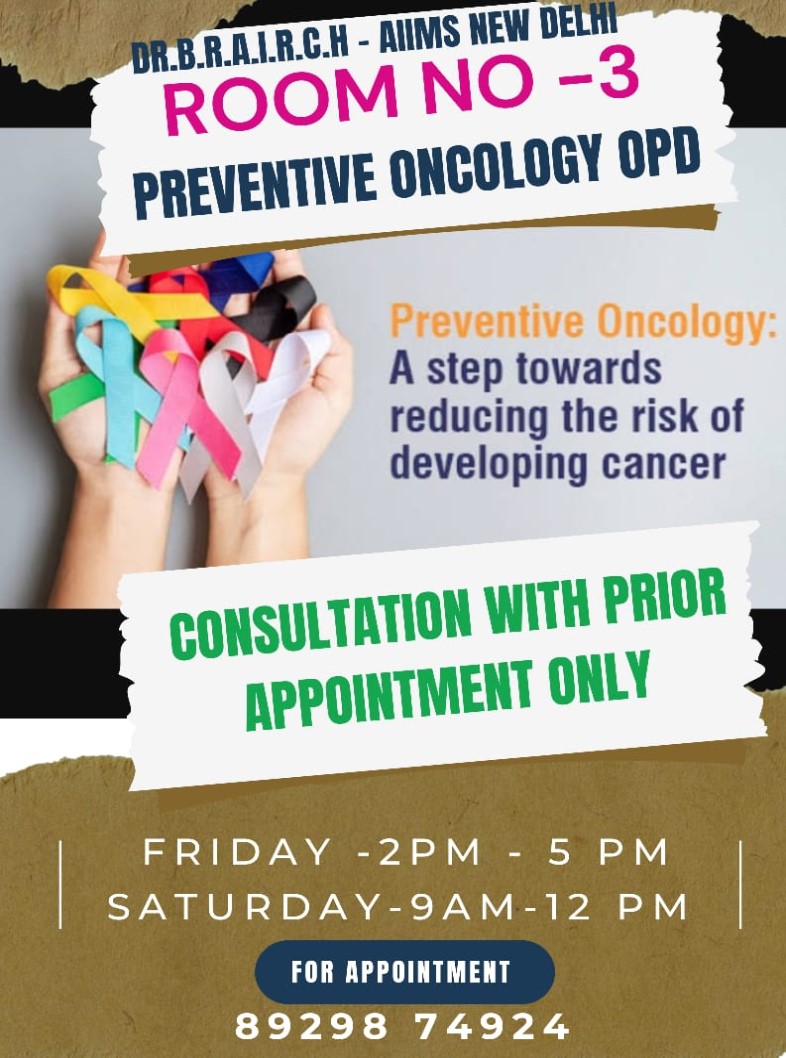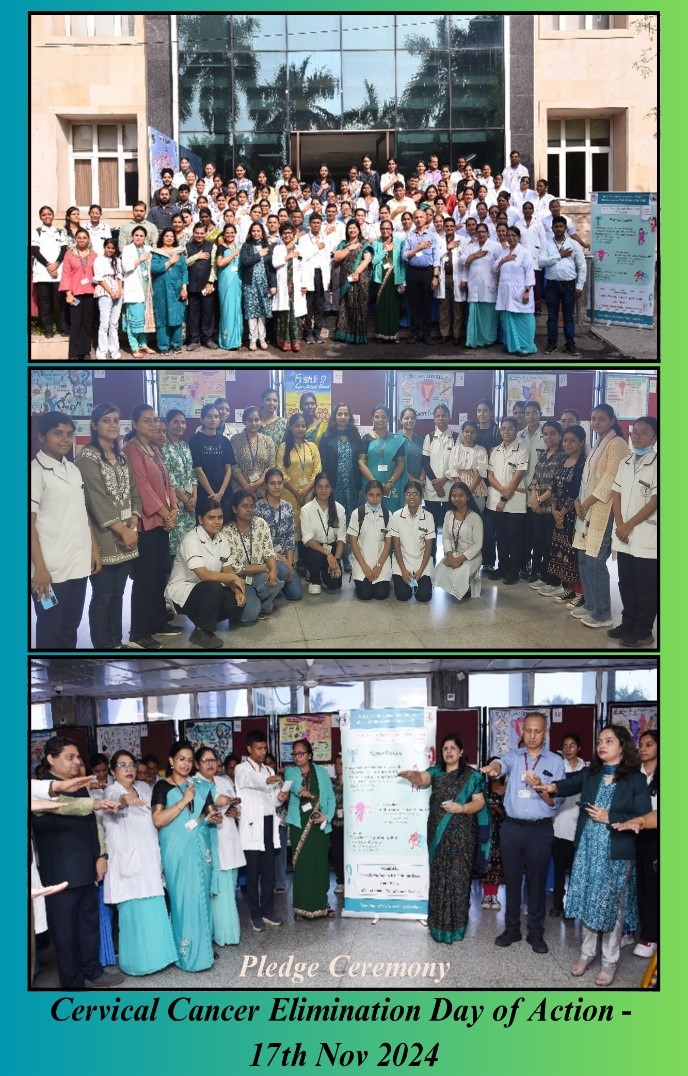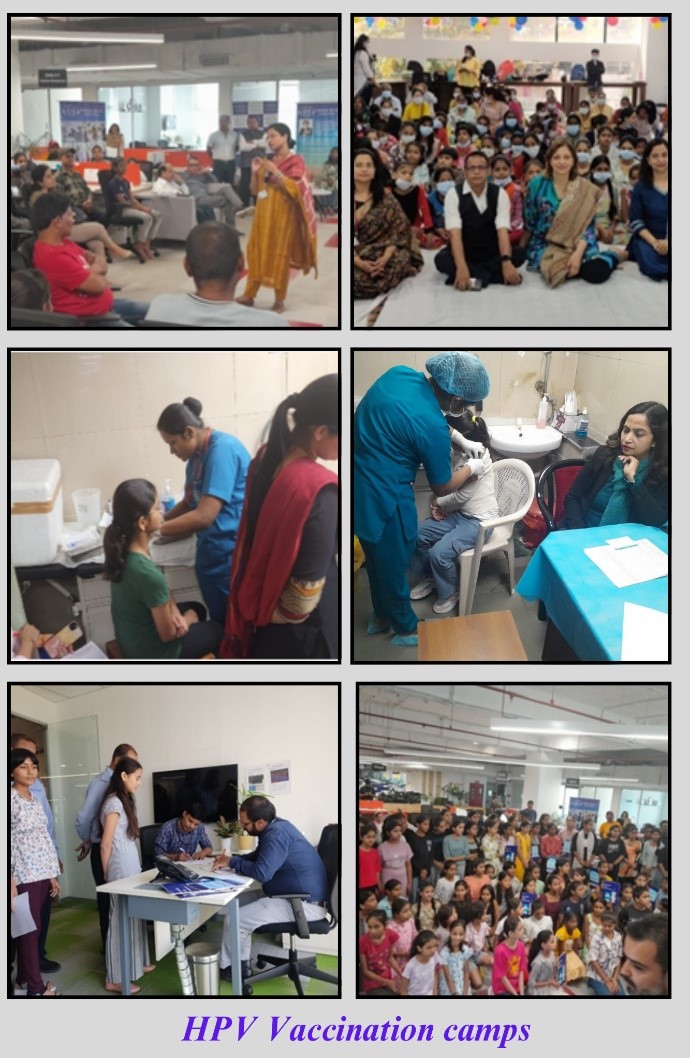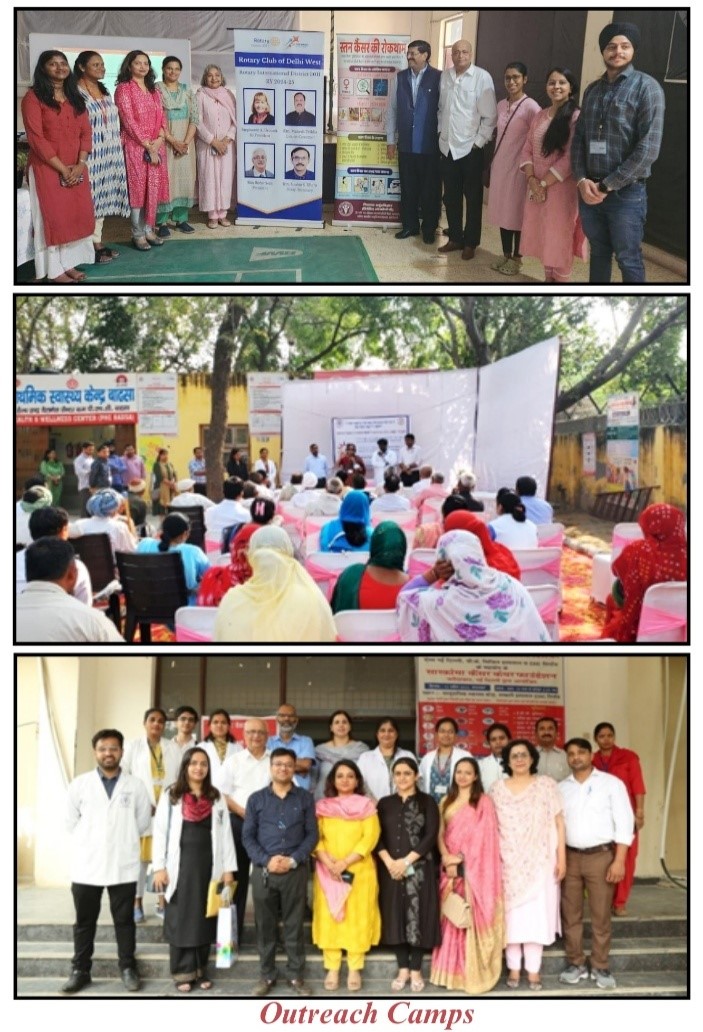पूर्व छात्र
Preventive oncology clinic
- विवरण
- अंतिम बार अपडेट हुआ सोमवार, 03 फरवरी 2025 16:34
Projects & Publications
- विवरण
- अंतिम बार अपडेट हुआ सोमवार, 03 फरवरी 2025 15:00
Projects in the department
-
A study to quantify the burden of insulin resistance in breast cancer women and its relation with other known prognostic and predictive factors of breast cancer
-
An observational study from North India to assess the readiness and motivation of ASHAs towards NPCDCS services
-
Effect of Smartphone application on breast self examination practice and adherence to follow-up screening schedule for female cancers: a pilot study
-
Implementation Research to Enhance Screening, Early Diagnosis and Initiation of Treatment for Oral, Breast and Cervical Cancer in Selected Districts of India
-
Early and Late development of Castration Resistant Prostate Cancer and its correlation with Androgen Receptor Ligand Binding Domain Mutations (PI).
-
Clinico-genetic prognostic signatures for development of metastatic Castration Resistant Prostate Cancer.
-
Genomics of Gall Bladder Carcinoma in Indian patients
-
Repurposing of drugs against drug-resistant small cell lung cancer cell lines
-
Identification of small immunogenic regions from SARS-CoV-2 spike protein for second generation vaccine development
-
Comparative study of Genetics, Clinical and Epidemiological factors of breast cancer in Indian Population
-
Detection of HPV circulating tumor DNA in cervical cancer patients before and after Chemoradiotherapy by Droplet Digital PCR.
-
Examining Lysyl oxidase (LoX) and p53 interaction in the context of cervical carcinogenesis
-
Repurposing of drugs against drug-resistant small cell lung cancer cell lines.
-
Identification of small immunogenic regions from SARS-CoV-2 spike protein for second generation vaccine development
-
Development and evaluation of a recombinant Mycobacterium indicuspranii (MIP)-based therapeutic vaccine against HPV to mitigate cervical cancer risk in women with established virus infection (funded by ICMR).
-
Development and validation of a Laboratory Developed Test (LDT) for detection of high-risk human papillomavirus (HPV) in patients with cancer and potentially malignant disorders of oral and oropharyngeal region (funded by Research Section, AIIMS New Delhi).
-
Targeting multiple cancer antigens for cancer immunotherapy with a recombinant Mycobacterium indicuspranii (MIP)-based approach and its evaluation using mouse tumor model (funded by SERB).
Recent Publications:
Sakshi Gupta, SaurabhYadav, Pawan Kumar (2024). Efficacy of Bacillus Calmette-Guérin in Cancer Prevention and its Putative Mechanisms. Journal of Cancer Prevention 2024;29(1):1-10.
Sujata Pathak. Induction of Apoptotic Signaling Pathways by 3’ methyl ATP in Different Malignant Cells: in vitro Study. Asian Pac J Cancer Prev., 2024 Aug. 25 (8), 2743-2750
Choudhury AR, Nagesh AM, Gupta S, Chaturvedi PK, Kumar N, Sandeep K, Pandey D. MicroRNA signature of stromal-epithelial interactions in prostate and breast cancers. Exp Cell Res. 2024 Aug 15;441(2):114171.
Shukla P, Priya H, Meena JK, Singh S, Bairwa M, Saini A. Readiness and Motivation of ASHAs towards Their Participation in Non-Communicable Disease Control Programmein North India:A Cross Sectional Study. Asian Pac J Cancer Prev. 2023 Sep 1;24(9):3235-3241.
Neeta Singh, Yogita Dogra, Pawan Kumar, Sandeep Mathur, Ashok Sharma, and Garima Patel (2023). Establishment of Cut-off Values for Uterine and Peripheral Blood Natural Killer Cells During the Peri-implantation Period in Fertile Controls and Women with Unexplained Recurrent Implantation Failure. Journal of Reproduction & Infertility 24 (4), 248-256
Pathak A, Tomar S, Pathak S. Epigenetics and Cancer: A Comprehensive Review. Asian Pacific Journal of Cancer Biology 16Mar.2023;8(1):75-79.
Shukla P, Vashist P, Suraj SS, Gupta V, Gupta N, Bharadwaj A. Effect ofintegrated people-centred eye care (IPEC) model on eye care seeking behaviour of community. Indian J Public Health. 2022 Jul-Sep;66(3):282-286.
Shukla P, Vashist P, Senjam SS, Gupta V, Gupta N. A study to assess theknowledge and skills of Accredited Social Health Activists and its retention after training in community-based primary eye care.Indian J Ophthalmol. 2022Jan;70(1):36-42.
Vashist P, Senjam SS, Gupta V, Gupta N, Shamanna BR, Wadhwani M, Shukla P, Manna S, Yadav S, Bharadwaj A. Blindness and visual impairment and their causes in India: Results of a nationally representative survey. PLoS One. 2022 Jul21;17(7):e0271736.
Manna S, Vashist P, Senjam SS, Shukla P, Gupta N, Bhardwaj A, Gupta V. VisionDelhi: A study of primary eye care model operational in urban slums andresettlement colonies of Delhi. J Family Med Prim Care. 2022 Jan;11(1):201-207.
Priya, Harsh; Bharathi, MP; Shukla, Pallavi1; Mishra, Deepika2. No more relay of the delay: Passing the baton to the digital technologies. Cancer Research, Statistics, and Treatment 5(3):p 617-618, Jul–Sep 2022.
Agarwal, Deepali; Purohit, Bharathi M.; Shukla, Pallavi1; Mishra, Deepika2; Priya, Harsh.Resurrection of tobacco cessation. Cancer Research, Statistics, and Treatment 5(3):p 618-619, Jul–Sep 2022.
Shukla P, Vashist P, Senjam SS, Gupta V. Evaluation of a training program onprimary eye care for an Accredited Social Health Activist (ASHA) in an urbandistrict.Indian J Ophthalmol. 2020 Feb;68(2):356-360.
GRID COVID-19 Study Group. Combating the COVID-19 pandemic in a resource-
constrained setting: insights from initial response in India. BMJ Glob Health.2020 Nov;5(11):e003416.
Shukla P, Vashist P, Singh SS, Gupta V, Gupta N, Wadhwani M, Bharadwaj A, Arora L. Assessing the inclusion of primary school children in vision screeningfor refractive error program of India. Indian J Ophthalmol. 2018Jul;66(7):935-939.
Wadhwani M, Vashist P, Singh SS, Gupta N, Malhotra S, Gupta A, Shukla P, Bhardwaj A, Gupta V. Diabetic retinopathy screening programme utilising non-mydriatic fundus imaging in slum populations of New Delhi, India. Trop Med IntHealth. 2018 Apr;23(4):405-414.
Pathak S, Bhatla N, Singh N. Inefficient one-carbon metabolism and promoter hypermethylation is associated with cervical carcinogenesis. Journal of colostomy and lower genital tract pathology.Published by Wolters Kluwer-Medknow. Page no 124
AAlam, MA Ansari, KF Badrealam, S Pathak. Molecular approaches to lung cancer prevention. Future Oncology 2022, 17 (14), 1793-1810, 2021
Bajpai D, Banerjee A, Pathak S, Thakur B, Jain SK, Singh N.Single nucleotide polymorphisms in the DNA repair genes in HPV-positive cervical cancer.Eur J Cancer Prev. 2016 May;25(3):224-31.
Pathak S, Alam A. Role of Biomarkers in Cancer Prevention and Therapy. In Toxicology and Human Health: Environmental Exposures and Biomarkers 2023 Jun 25 (pp. 179-195). Singapore: Springer Nature Singapore.
Choudhury AR, Nagesh AM, Gupta S, Chaturvedi PK, Kumar N, Sandeep K, Pandey D. MicroRNA signature of stromal-epithelial interactions in prostate and breast cancers. Exp Cell Res. 2024 Aug 15;441(2):114171. doi: 10.1016/j.yexcr.2024.114171. Epub 2024 Jul 17. PMID: 39029573.
Role of green tea catechins in modulating stromal-epithelial interaction in prostate cells. Devi, Nandana; Nagesh, A Muni; Jala, Moses Azaraiah; Gupta, Surabhi; Chaturvedi, Pradeep Kumar; Kumar, Neeraj; Sandeep, Kumar; Pandey, Deepak. IJNPR Vol.13(4) [March 2023] 28-36
Kumar S, Sandeep K, Kumar R, Kumar A. Antimicrobial effect of pimozide by targeting ROS-mediated killing in Staphylococcus aureus. BiotechnolApplBiochem. 2023 Oct;70(5):1679-1689. Kumar L, Kumar S, Sandeep K, Patel SKS. Therapeutic Approaches in Pancreatic Cancer: Recent Updates. Biomedicines. 2023; 11(6):1611. https://doi.org/10.3390/biomedicines11061611
Srivastava S, Singh A, Sandeep K, Yadav D. Epigenetic Regulation of Gut Microbial Dysbiosis. Indian J Microbiol. 2021 Jun;61(2):125-129
Shankar A , Roy S , Rath GK, Kamal VK, Kharade V, Sandeep K. Carcinoma Uterine Cervix: Evolving trends and Impact of National Cancer Control Program in India. IJSPRO 2017; 1 (1), 16-22
Choudhury AR, Kumar N, Sandeep K, Pandey D (2017) Biotechnological Potential of Stem Cells. J Stem Cell Res Ther 3(1): 00090
DurgavatiYadav, Kumar Sandeep, Deepak Pandey, RanuKumariDutta (2017) Liposomes for Drug Delivery, J BiotechnolBiomater 2017, 7:4.
Kumar Sandeep, Interaction of liposomes with cancer cells: Influence of liposome surfaceproperties on cellular uptake. Int J Pharm Bio Sci 2016 Jan; 7(1): (P) 199 – 205.
Emran TB, Iyori M, Ono Y, Amelia F, Yusuf Y, Islam A, Alam A, Tamura M, Ogawa R, Matsuoka H, Yamamoto DS. Baculovirus-induced fast-acting innate immunity kills liver-stage Plasmodium. The Journal of Immunology. 2018 Oct 15;201(8):2441-51.
Yusuf Y, Yoshii T, Iyori M, Yoshida K, Mizukami H, Fukumoto S, Yamamoto DS, Alam A, Emran TB, Amelia F, Islam A. Adeno-associated virus as an effective malaria booster vaccine following adenovirus priming. Frontiers in Immunology. 2019 Apr 5;10:730.
Alam A. Laboratory diagnosis of malaria: an update. InFalciparum Malaria 2024 Jan 1 (pp. 41-58). Academic Press.
P Kumar, S Bhaskar (2016). Analysis of T Cell Proliferating and Polarizing Potential of Murine Dendritic Cells in Allogeneic-Mixed Leukocyte Reaction. Bio-protocol 6 (5), e1750.
P Kumar (2016).Adult pulmonary tuberculosis as a pathological manifestation of hyperactive antimycobacterial immune response.Clin Trans Med 5(38): 1-7.
P Kumar (2017).IFNγ-producing CD4+ T lymphocytes: the double-edged swords in tuberculosis. Clin Trans Med 6(21): 1-7.
P Kumar, V John , A Gupta, S Bhaskar (2018). Enhanced survival of BCG-stimulated dendritic cells: involvement of anti-apoptotic proteins and NF-κB. Biology Open, bio. 032045.
B Singh, M Saqib, A Gupta, P Kumar, S Bhaskar (2017). Autophagy induction by Mycobacterium indicuspraniipromotes Mycobacterium tuberculosis clearance from RAW 264.7 macrophages. PLoS ONE 12(12):e0189606.
P Kumar, G Das, S Bhaskar (2019). Mycobacterium indicuspranii therapy induces tumor regression in MyD88- and TLR2-dependent manner. BMC research notes 12 (1), 648.
P Kumar, S Bhaskar (2019). Myeloid differentiation primary response protein 88 (MyD88)-deficient dendritic cells exhibit a skewed cytokine response to BCG. BMC Research Notes 12 (1), 52.
L Pal, R Nandani, P Kumar, B Swami, G Roy and S Bhaskar (2021). Macrophages Are the Key Players in Promoting Hyper-Inflammatory Response in a Mouse Model of TB-IRIS. Frontiers in Immunology 12:775177.
P Kumar (2021).A perspective on the Success and Failure of BCG. Frontiers in Immunology 12:778028.
Research
- विवरण
- अंतिम बार अपडेट हुआ शनिवार, 21 दिसम्बर 2024 12:26
Research
-
Cancer Epidemiology Research: Conducting studies to understand the patterns, causes, and risk factors of cancer in different populations, with a focus on high-risk groups.
-
Community-based Research: Developing community-oriented research projects to assess the impact of outreach programs on cancer prevention and early detection.
Introduction
- विवरण
- अंतिम बार अपडेट हुआ सोमवार, 03 फरवरी 2025 15:19
|
Introduction: 2 Preventive Oncology plays a pivotal role in cancer prevention and early detection, offering both clinical and outreach services to diverse populations. Through its academic endeavors, it also contributes to the training of healthcare professionals and advances research in cancer prevention strategies. It functions as an essential part of a multidisciplinary approach to cancer control, working closely with other departments, public health organizations, and communities. The department focuses on various cancers, especially those that are preventable, and offers both clinical and outreach services. Additionally, it plays a crucial role in academics, contributing to the training of healthcare professionals and the dissemination of cancer prevention knowledge. |
|
Key Objectives :
|
|
Patient care Services
- विवरण
- अंतिम बार अपडेट हुआ शनिवार, 01 फरवरी 2025 11:02
आलेख और अधिक ...
हमसे संपर्क करें
अखिल भारतीय आयुर्विज्ञान संस्थान
अंसारी नगर, नई दिल्ली - 110029
+91-11-26588500 / 26588700
फैक्स: +91-11-26588663 / 26588641
एम्स में महत्वपूर्ण ई -मेल पते








